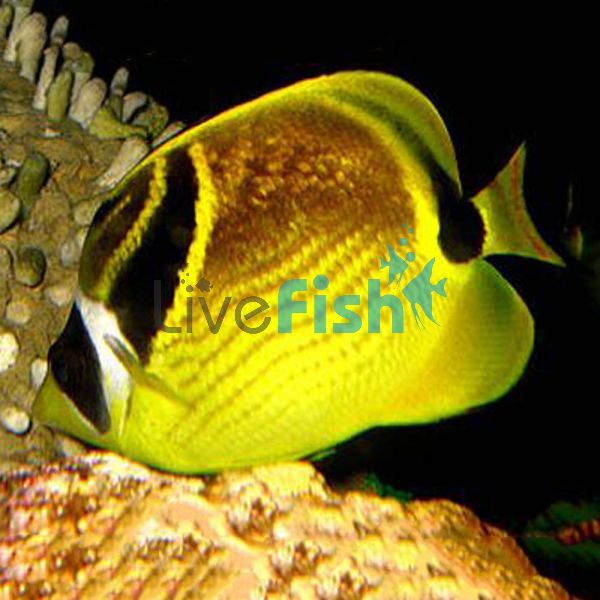Raccoon Butterflyfish - Medium
The Raccoon Butterflyfish has a distinctive masked face, its nocturnal lifestyle will provide an aquarium with activity while other fish are resting.
Raccoon Butterflyfish
The body colouration of the Raccoon Butterflyfish is yellow/orange, with darker shading moving up to the top of the body. There are dark spots below the front of the dorsal fin and in just front of its tail. A black band runs over its eye, with a white band behind it. A second black mark with a yellow outline runs from the white band up to the dorsal fin.
These are hardy fish, and easy to take care of, which makes them suitable for beginner aquarists. However, due to its size and love of swimming, it will need a large tank.
Raccoon Butterflyfish are pelagic spawners. They release all their eggs into the planktonic water column. The eggs will float there, moving with currents, until hatching.
Male and females don’t have any noticeable differences. They are gonochoristic, either male or female without the ability to change sex. They breed in pairs and are monogamous.
The natural habit for this species is in shallow seaward reefs, lagoons, and channels. They can be found and depths of between 15-70 meters but are most common in depths of up to 30 meters.
Raccoon Butterflyfish originates from the Indo-Pacific region, including Africa, Fiji, Maldives, Indonesia, and Hawaii. It can also be found in the Southeast Atlantic around South Africa.
Tank Recommendations for the Raccoon Butterflyfish
The smallest tank size you should keep these Butterflyfish in is 125 gallons (473 liters).
Raccoon Butterflyfish will eat corals and invertebrates, so they are not considered reef safe. A Fish Only With Live Rock environment is recommended.
A suitable aquarium should have plenty of rock for grazing and shelter, sand and coral mix substrate, as well as a large area of open space for swimming.
Suitable Tank Buddies
Raccoon Butterflyfish are best suited to sharing a fish-only tank with peaceful tank buddies. Ideally, a fish-only tank as it will eat crustaceans and is not reef or coral safe.
The Racoon Butterflyfish has a peaceful temperament and can be housed with other Butterflyfish.
Usually Compatible
Raccoon Butterflyfish can be housed with conspecifics. Other suitable tank buddies include smaller, non-aggressive fish such as Gobies, Fairy Basslets, and Fairy Wrasse.
Sometime Compatible
Caution is advised if housing this species with semi-aggressive fish such as Anthias, Clownfish, Angels, Tangs, and large Wrasse.
Rarely Compatible
Aggressive territorial fish should be avoided. These include Lionfish, Groupers, Dottybacks, Damselfish, and Sharks/Rays. Delicate species such as Seahorse/Pipefish are unsuitable, as well as crustaceans, anemones, and corals.
Feeding Your Racoon Butterflyfish
The Raccoon Butterflyfish is omnivorous. They will eat a variety of meaty foods including mysis shrimp and crustacean flesh. Frozen preparations, flake food, and sponge-based food are also suitable. Racoon Butterflyfish graze on algae and will consume plant-based food such as Nori. It is recommended to feed Raccoon Butterflyfish at least 2 times per day. Juveniles need feeding 3-4 times per day.
| Scientific Name | Chaetodon Lunula |
|---|---|
| Care Level | Easy |
| Common Names | Bandit Butterflyfish, Halfmoon butterflyfish, Crescent-masked Butterflyfish, Moon butterflyfish and Lunula Butterflyfish |
| Diet | Omnivore |
| Fish Family | Chaetodontidae |
| Lifespan (years) | 6 |
| Max. Length (cm) | 20.5 |
| Min. Tank Volume (l) | 473 |
| Origin | Indo-Pacific region, including Africa, Fiji, Maldives, Indonesia, and Hawaii. South East Atlantic, South Africa |
| Reef Safe | No |
| Sociability | Peaceful |
| Venomous | No |
| Water Conditions | 22.2-25.5°C (72-78° F), dKH 8-12, pH 8.1-8.4, sg 1.020-1.025 |




